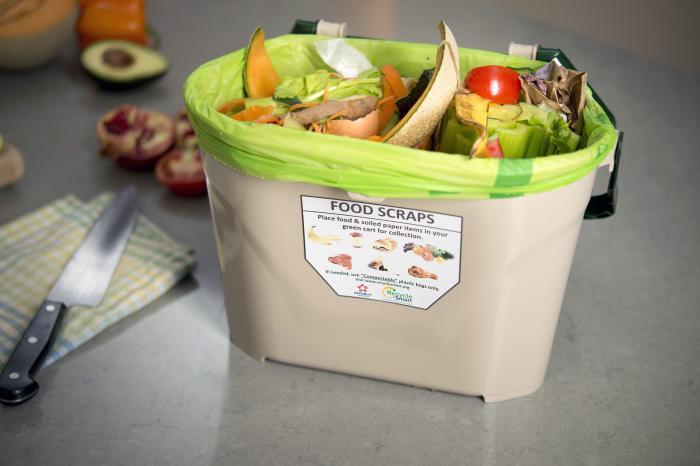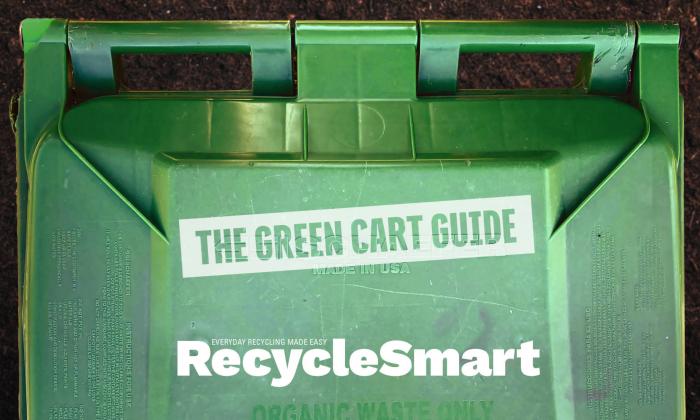California’s Short-Lived Climate Pollutant Reduction Strategy
In September 2016, the Governor set methane emissions reduction targets for California (SB 1383 Lara, Chapter 395, Statutes of 2016) in a statewide effort to reduce emissions of short-lived climate pollutants (SLCP). California must:
- Reduce organic waste disposal by 50% by 2020 and 75% by 2025.
- Rescue for people to eat at least 20% of currently disposed surplus food by 2025.
This law expands upon the goals of AB 341: Mandatory Commercial Recycling and AB 1826: Mandatory Commercial Organics. However, SB 1383 is unique in that it impacts residents in addition to businesses, and it requires some businesses to donate excess edible food to feed people in addition to composting organic materials. Unlike previous laws, there are significant penalties for non-compliance.
Fights Climate Change and Helps Public Health
Organics like all food scraps, yard trimmings, and uncoated paper make up half of what Californians dump in landfills each year. Organics decomposing in a landfill create methane, a climate super pollutant. Reducing Short-Lived Climate Super Pollutants like methane will help the climate crisis.
Organic discards in landfills emit:
- 20% of the state’s methane, a climate super pollutant 84 times more potent than carbon dioxide.
- Air pollutants like PM 2.5, which contribute to health conditions such as asthma.
Timeline
January 1, 2022 – CalRecycle’s regulations to meet the organic waste reduction targets take effect.
January 1, 2024 – Jurisdictions may impose penalties for non-compliance on regulated entities subject to their authority.
January 1, 2025 – By this date, the state must achieve a 75% reduction in the level of statewide disposal of organic waste from the 2014 level. In addition, not less than 20 percent of currently disposed of edible food must be recovered for human consumption.
Contamination Monitoring
SB 1383 requires local jurisdictions to monitor contamination and proper sorting of organics by performing annual route audits. RecycleSmart or its contractor may be in your neighborhood throughout the year performing ‘lid-flips’ and looking into your carts including, organics, recycling, and landfill (residential and commercial). RecycleSmart is only looking for proper sorting and may leave outreach on your carts with helpful tips and suggestions.
To learn more about what materials are accepted in the green organics cart click here.
Who’s Affected? (Regulated Entities)
If you have a question or concern pertaining to SB 1383 please contact us.
- Single-family homes (condos, townhomes and multi-family complexes with 4 or fewer units)
- Multi-family complexes (with 5+ units)
- Commercial businesses
- Local Education Agencies
How to Participate in Organics Programs to be Compliant with SB 1383.
SINGLE FAMILY HOME RESIDENTS
Residents can participate in organics programs provided by the Franchised service provider, Republic Services (the green cart!) to compost organic materials at no additional cost to your services.
Self Haul: It is not mandatory in the RecycleSmart service area to subscribe to services provided by Republic Services, however, all three material streams (organics, recyclable materials and landfill) must be sorted and disposed of at a facility with the ability to process these materials properly. Subscribing to services in Unincorporated County is mandatory unless granted an exemption from the County’s Environmental Health Division of the Health Services Department.
Use a compost bin! Compost your green material, food soiled paper (uncoated) and food scraps at home! Attend a free workshop, and reduce the material you’re putting in your carts today! Learn more about backyard composting and purchase a reduced cost compost bin.
COMMERCIAL ENTITIES AND MULTIFAMILY PROPERTIES
1. Divert and recover your organics from the landfill.
- Subscribe to regular organics collection service with the Franchised hauler, Republic Services, or
- Self/back-haul organics to a local facility:
- If you self/back-haul, please complete the Alternative Compliance Form.
- A record must be kept showing the amount of organic material delivered to each facility; this record shall be subject to inspection.
- Records must include delivery receipts and weight tickets that indicate the amount of material in cubic yards or tons.
2. Provide organics and recycling service to employees, contractors, tenants, and customers.
- Collection service must be arranged so that access to an adequate number, size, and location of containers is available.
- Small indoor containers for organics and recycling must be provided in all areas where garbage containers are present, except for restrooms.*
- For all outdoor and indoor containers, the container bodies or lids shall conform to the following color scheme: gray/black for landfill, blue for recycling, and green for organics. In addition, containers shall have labels with graphic images to indicate primary materials accepted and prohibited.
- Annually provide educational information about the legal requirement to compost and recycle. In addition, education must be provided on how to properly sort the three waste streams into correct containers. Please note, for new tenants, this information must be provided before or within 14 days of move-in.
- Multifamily: Please share this short educational video with your tenants to comply with this educational requirement.
- Commercial: Please share this short educational video with your tenants to comply with this educational requirement.
- Periodically inspect recycling and organics containers and inform employees if contamination is found.
*Denotes requirements from which multifamily residential dwellings are exempted.
Reference: SB 1383 Regulations §§ 18984.7, 18984.8, 18984.9, 18984.10, 18986.1, 18986.2, 18988.3, 18991.3, 18991.4
Commercial Entities: Food Recovery Requirement
“Tier One” and “Tier Two” commercial food generators (grocery stores, large restaurants, wholesalers/distributors, most schools, large events and venues, etc.) are required to donate the maximum amount of excess edible food to feed people.
For SB 1383 food recovery requirements and to determine if your food generating business is required to donate food click here.
LOCAL EDUCATION AGENCIES (SCHOOLS)
Public Schools, Charter Schools and County Offices of Education are Regulated Entities under SB 1383. For more information about requirements
for schools click here.




